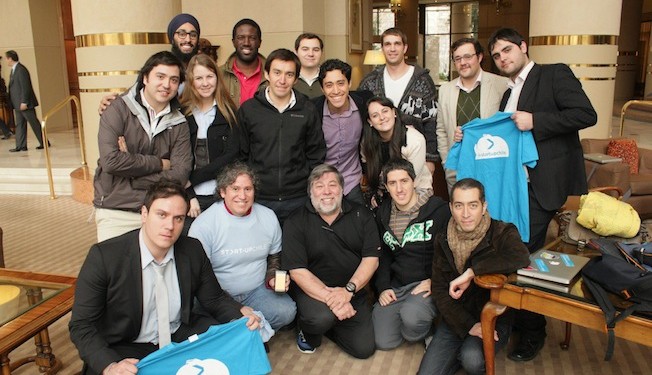The US is often touted as a nation of immigrants, but just how easy is it for FSEMs to find their way there? Well known tech entrepreneur and academic Vivek Wadhwa has talked extensively about his interactions with innovators all around the world, who have gained an education in the US or worked there. He reports that immigration restrictions are holding many back from fulfilling their goals in the States – a view shared by high profile immigration reformers like Mark Zuckerberg, CEO of Facebook, and President Barack Obama himself.
News and business analysis for Professionals in International Education
Have some pie!
The rise of the “foreign student entrepreneur migrant” (FSEM)
 Apple co-founders with Start Up Chile beneficiaries
Apple co-founders with Start Up Chile beneficiaries “Many countries, including Australia, Canada, Chile, China, and Singapore, recognise the opportunity in attracting entrepreneurs, technologists, and other skilled workers,” Wadhwa writes in his book The Immigrant Exodus.
“These countries are offering stipends, labour subsidies for employees, expedited visa processes, and other inducements to bring in startups. As a result of these aggressive recruitment policies, hundreds, if not thousands, of startup companies that might have launched in America are now elsewhere.”
“As a result of these aggressive recruitment policies, hundreds, if not thousands, of startup companies that might have launched in America are now elsewhere”
The root of the problem lies in the tough conditions placed upon those holding the H1B visa, which allows US employers to temporarily employ foreign workers in specialty occupations – and can offer FSEMs a launch pad to achieve their own ventures.
However, there has been some concession with the launch of the the StartUp Visa in 2011 – a temporary immigrant visa, or conditional permanent resident visa which converts to a permanent residency (green card) after two years if certain conditions are met. Use of the visa is limited though– the StartUp Visa does not actually allocate any new visas, but draws from unused EB-5 Investor Visa category which is capped at 9,940 visas annually.
Chile
Canadian Simon Papineau put his Project Management course at HEC Montreal business school on hold to relocate to Chile when he was selected to take his business idea to StartUp Chile – the most innovative start up “incubator” programme to emerge from Latin America region in years. The scheme, offers participants a six-month opportunity to network and build their idea with US$40,000 backing. A year-long visa is offered to successful outfits, too, and about 40% of participants stay on for the year as allowed; some 25% for longer.
StartUp Chile has courted much attention overseas and helped Chile grow in repute as a haven for ambitious innovators. “There are more and more requests for us to help them get residency,” says Sebastian Vidal, sub-executive director of StartUp Chile. “For a foreign student wanting to start a business, Start-Up Chile is probably the most accessible accelerator programme in the world at the moment.”
“Many countries, including Australia, Canada, Chile, China, and Singapore, recognise the opportunity in attracting entrepreneurs”
The Netherlands
The Netherlands has said it wants to attract more foreign students to help plug skills gaps in its workforce, and the private sector has promised a thousand scholarships annually to attract tech talent. Entrepreneurs can also access the Investor Visa, which gives holders a year’s residence and is renewable. The main condition for renewal is that the holder of the permit keeps being active in the business and keeps his or her personal income up to welfare level (around €800 per month).
This has meant opportunities for FSEMs, such as Isabel Castano. A Colombian native and now Dutch citizen, she moved to the Netherlands in 2000. Once there she took a Masters in European Culture and Civilisation and developed a passion for teaching languages – something that inspired her to set up Influencia Latina, a firm connecting aspiring learners of Spanish and Dutch online.
Still looking? Find by category:



A well researched article that would be helpful to our country India by creating opportunities for attracting technologists or patent holders, particularly NRIs, for start ups here. The GOI has several schemes of supporting technology incubators and such a programme can be easily embedded in it.
An informative article indeed. As a citizen of US after reading this piece, I feel that US needs to do more for the FSEMs.
Yes programs like StartUp Chile too are very enthusiastic about their tie-ups with local educational institutes and unis, because they say it inspires local entrepreneurs to have foreign talent, helps them dream bigger (global), as much as it offers a chance to foreigners to launch their ideas and test the market with a lot of their expenses covered.
For FSEMS, I think traditional routes like international education
will continue to attract the modern day entrepreneur migrant looking to work in countries where barriers to entry are low, bureaucratic red tape minimal and diversity highly valued – as we saw in the case of Ashima Kudaisya, Wai Hong Fong, Simon, Isabel and the rest.
Yes, there are so many more inspiring stories that are waiting to benefit from a good student migration policy.
Barrier many governemnts have come up against in recent years, especially in anglo world, has been negative lobbying and influence of “white nativists” demanding restrictions on immigration, population growth, NOM, student work rights, student visas etc..
By using such proxy issues they are of course not racist! 🙂